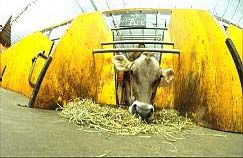The main factors influencing the feed intake of lactating dairy cows have been investigated in extensive research projects at the Institute for Livestock Research in recent years (GRUBER et al. 1991a, 1991b, 1995, 2000). These are the milk production potential and the live mass of the cow as well as the quality of the basic feed and the concentrate level as so-called nutritive factors. From this data material, which was developed over a period of 20 years, estimation formulas for predicting the feed intake of lactating dairy cows were derived (GRUBER et al. 1990, 2001a) and several reviews were written (GRUBER 1987, SCHWARZ & GRUBER 1999, GRUBER et al. 2001b). In addition to the studies at the LFZ Raumberg-Gumpenstein, a database of 70,000 individual cow results with all the necessary parameters was built up as part of a cooperation with 10 research and university institutes in Germany, Austria and Switzerland, and a feed intake estimation formula for these countries was derived from this (GRUBER et al . 2004). This formula is primarily put into practice through ration programs.
In order to be able to model the complete production cycle of a cow, including the dry period, realistically and practically, the feed intake capacity during the dry period must also be examined. This depends on the basic feed quality and the concentrated feed content as well as, above all, on the nutritional status (energy balance, evident from body condition) at the end of lactation. It is expected that underfeeding during peak lactation will lead to high feed intake at the end of lactation or the dry period in order to replenish nutrient reserves, and vice versa. The aim of the project is an estimation formula for predicting the feed intake of dry cows. This question is investigated with the following experimental plan:
Experimental plan: Concentrated feed proportions in the lactation phases
|
Energy level |
1st third of lactation |
2nd third of lactation |
3rd third of lactation |
Dry period |
|
Low |
20 |
10 |
0 |
0 |
|
20 |
15 |
|||
|
40 |
30 |
|||
|
Medium |
40 |
30 |
0 |
0 |
|
20 |
15 |
|||
|
40 |
30 |
|||
|
High |
60 |
50 |
0 |
0 |
|
20 |
15 |
|||
|
40 |
30 |
63 cows from the LFZ Raumberg-Gumpenstein dairy herd are used for the experiment. The experimental plan shows that the different energy supply in the individual lactation phases is achieved by different concentrate proportions. This different energy supply during lactation and a differentiated ration design in the dry period itself result in a 2-factorial experimental design with which the main influencing factors of feed intake in the dry period are examined (energy balance during lactation × ration design in the dry period).
Further information on project management can be found in the database for research and sustainable development (Dafne) -> Link







